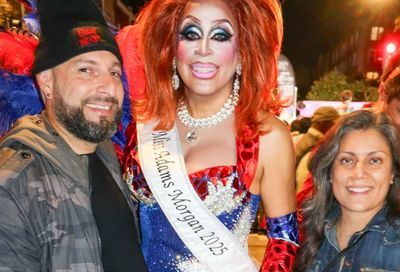After the Fallout
Terminated staff react to David Catania's criticism of Whitman-Walker Clinic's recent managerial decisions
by Yusef Najafi
February 4, 2009
Ask Barbara Chinn and Dr. Patricia Hawkins if they would consider working again for Whitman-Walker Clinic (www.wwc.org), where they were employed for more than two decades before being laid off without severance in December, and both begin their replies identically: ”I love the clinic.”
Chinn, 64, former director of WWC’s Max Robinson Center in Southeast and a lesbian, says, ”I believe in it wholeheartedly, not only for the GLBT community, but for the community as a whole, for the underserved.”

David Catania
”I think that no one who’s ever worked there would not go back if they had the chance,” says the 68-year-old Hawkins, a licensed clinical social worker and psychologist and also a lesbian, who worked as the clinic’s associate executive director for policy and external affairs.
It’s a question worth asking considering possible changes in Whitman-Walker Clinic’s future, prompted by a three-hour D.C. City Council public roundtable Jan. 28 called by David Catania (I-At large), chair of the Committee on Health.
At that meeting, Catania questioned clinic CEO Donald Blanchon at length about the restructuring efforts and announced that he would be asking for a full investigation into the clinic’s management.
”I have no idea what that investigation would show, but I think it’s important,” Hawkins told Metro Weekly. ”There’s enough concern about what is happening at the clinic.”
Catania told Blanchon and the roomful of about 50 attendees at the Jan. 28 roundtable that during the past three and a half years he has chaired the Committee on Health, he has collected $6 million for the clinic in government funding. Why then, he asked, did Blanchon or his board of directors not consult with the Committee on Health before making several drastic cutbacks?
Under Blanchon’s management, the clinic’s 1407 S St. NW administrative building has been sold and the Virginia branch has closed. Several employees, including senior staffers Chinn and Hawkins, have been let go.
In addition to Catania’s claim that the clinic did not take advantage of revenue like the Federally Qualified Health Center (FQHC) wrap-around payments, Wallace Corbett, chair of the city’s Ryan White Planning Council, testified that clinic management have not been claiming funds to which WWC may be entitled. Corbett described the leadership as ”unclear and low-focused.”
At the Jan. 28 meeting, Blanchon did not articulate why he or members of his board of directors did not consult with the Committee on Health or its Virginia counterpart prior to making cuts. Instead he stressed ”difficult times” in light of the economic downturn, as well as the clinic’s commitment to fighting HIV in D.C., including his own personal commitment to do so, stemming from the death of his brother due to AIDS-related illness.
A Feb. 3 statement from WWC sought to address Catania’s line of questioning in some part: ”This historic economic recession pushed us to make some very difficult choices including program closings and staff layoffs. It is never easy to close programs or lay off employees, especially those who have served our community over many years. And it’s difficult to say ‘goodbye’ to any of our employees. Yet, at the same time, we have a fiduciary responsibility to ensure that Whitman-Walker Clinic is able to provide the core services to the members of the community we serve. We cannot do this if we are not financially sound.”
The statement goes on to say that the clinic is facing ”two pressures from the economic recession. First, we are caring for more patients who have lost their jobs and insurance and are coming to us for uncompensated care. Second, our major revenue sources — government funds and private donations — have declined in recent years. Left unaddressed, these two realities would threaten the Clinic’s very existence.”
The statement reads much like Blanchon’s Jan. 28 testimony, which was challenged by Catania, who at one point accused Blanchon of lying both to him and members of his staff.
Chinn is embarrassed for the clinic. ”That’s my honest feeling,” she says. ”We’re talking about the stewardship of people’s lives. Not only staff, but, more importantly, clients.”
Hawkins says under the leadership of Councilmember Jim Graham (D-Ward 1), who served as the clinic’s executive director through the 1980s and ’90s, things were different. Blanchon took over leadership of the clinic in 2006, following an earlier period of economic upheaval at the clinic.
”We never closed a program that we weren’t absolutely forced to close,” she says. ”We tried everything under the sun to make sure the program stayed in place. That did not appear to be what was happening in this situation….
”We’ve been in tight times before, and historically the senior staff has taken pay cuts until things got better. That’s not happened this time. People have deferred raises until things got better, but that did not happen this time. And we’ve gone after other sources of revenue, including the City Council, to help us get through…and we had always gotten through those bad times.”
Chinn says that recently clinic management had become less transparent, a change for the staff used to a more open management style.
Today, some members of the community, including Catania, believe that under Blanchon’s management, the GLBT aspect of Whitman-Walker Clinic, which was founded in 1973 as a gay men’s STD clinic, seems to be diminishing. While Catania and Graham are gay, Blanchon is straight.
”I think the record would speak to that,” Hawkins says, pointing to some cuts in GLBT-specific programs since Blanchon’s arrival. ”I think [Catania] is fair in that assessment.”
Hawkins says the Committee on Health’s intent to investigate the clinic’s management should be a wake-up call to the city’s GLBT community to become active.
”Whitman-Walker Clinic is a core institution in our community,” she says. ”I think it has served people extremely well and I think if we are going to lose more of that, then we need to step forward and take a look at what’s happening, and make sure it doesn’t happen in a bad way.”
Ted Miller to Lead Whitman-Walker Foundation
Miller will oversee Whitman-Walker's philanthropic efforts to ensure financial stability for center's health and research arms.
By John Riley on November 8, 2024 @JRileyMW
Whitman-Walker, the D.C.-based community health center specializing in LGBTQ health care and HIV prevention and treatment, has named Ted Miller, a former Obama administration official, as the interim executive director of the Whitman-Walker Foundation.
As head of the foundation, which serves as the health center's philanthropic arm, Miller will be charged with fundraising and uses community-based philanthropy to ensure the sustainability and growth of Whitman-Walker Health, the center's medical services arm, run by CEO Naseema Shafi, and the Whitman-Walker Health System, run by CEO Dr. Heather Aaron.
Whitman-Walker’s Walk to End HIV is December 7
Organizers are hoping to raise at least $550,000 to benefit Whitman-Walker's HIV testing, treatment, and prevention services.
By John Riley on November 11, 2024 @JRileyMW
Whitman-Walker's 38th Walk & 5K to End HIV will take place on Saturday, December 7 at Anacostia Park.
The walk serves as the federally qualified health center's annual fundraiser, raising money for Whitman-Walker Health's HIV prevention and treatment services.
Organizers are hoping to raise at least $550,000 this year.
Specializing in HIV care, primary care, and LGBTQ-competent health care services, Whitman-Walker currently serves clients at its 1525 building, located on 14th Street in the Logan Circle neighborhood, and the Max Robinson Center on the east campus of Saint Elizabeths, in Southeast D.C.’s Congress Heights neighborhood.
Support Metro Weekly’s Journalism
These are challenging times for news organizations. And yet it’s crucial we stay active and provide vital resources and information to both our local readers and the world. So won’t you please take a moment and consider supporting Metro Weekly with a membership? For as little as $5 a month, you can help ensure Metro Weekly magazine and MetroWeekly.com remain free, viable resources as we provide the best, most diverse, culturally-resonant LGBTQ coverage in both the D.C. region and around the world. Memberships come with exclusive perks and discounts, your own personal digital delivery of each week’s magazine (and an archive), access to our Member's Lounge when it launches this fall, and exclusive members-only items like Metro Weekly Membership Mugs and Tote Bags! Check out all our membership levels here and please join us today!
The Magazine
-
Most Popular
 'Wicked' is Overstuffed and Undercooked
'Wicked' is Overstuffed and Undercooked  Crowd Cheers as Trans Women Beaten in Minneapolis
Crowd Cheers as Trans Women Beaten in Minneapolis  Gay Adult Film Star Blasted for Hailing Trump's Victory
Gay Adult Film Star Blasted for Hailing Trump's Victory  Jussie Smollett's Conviction for Hate Crime Hoax Reversed
Jussie Smollett's Conviction for Hate Crime Hoax Reversed  Signature's 'Forum' is an Uproarious Roman Holiday
Signature's 'Forum' is an Uproarious Roman Holiday  Predator Meets Prey in Gay Cruising Allegory
Predator Meets Prey in Gay Cruising Allegory  12 Maryland College Students Use Grindr to Assault a Gay Man
12 Maryland College Students Use Grindr to Assault a Gay Man  'Gladiator II' is a Thrilling Roman Fight Club
'Gladiator II' is a Thrilling Roman Fight Club  A Grim Report Details Anti-Trans Violence in America
A Grim Report Details Anti-Trans Violence in America  Same-Sex Kiss Cut from 'Gladiator II'
Same-Sex Kiss Cut from 'Gladiator II'
 Jussie Smollett's Conviction for Hate Crime Hoax Reversed
Jussie Smollett's Conviction for Hate Crime Hoax Reversed  Crowd Cheers as Trans Women Beaten in Minneapolis
Crowd Cheers as Trans Women Beaten in Minneapolis  This Week's Advertisers: J.Paul - The Soprano, Nov. 21, 2024
This Week's Advertisers: J.Paul - The Soprano, Nov. 21, 2024  'Gladiator II' is a Thrilling Roman Fight Club
'Gladiator II' is a Thrilling Roman Fight Club  'Wicked' is Overstuffed and Undercooked
'Wicked' is Overstuffed and Undercooked  Sarah McBride Criticized for Complying with Restroom Ban
Sarah McBride Criticized for Complying with Restroom Ban  Man Sentenced to Life for Murder of Gay Jewish Student
Man Sentenced to Life for Murder of Gay Jewish Student  Speaker Mike Johnson Imposes a Trans Restroom Ban
Speaker Mike Johnson Imposes a Trans Restroom Ban  Gay People Targeted with 'Re-Education Camp' Texts
Gay People Targeted with 'Re-Education Camp' Texts  A Grim Report Details Anti-Trans Violence in America
A Grim Report Details Anti-Trans Violence in America
Scene
Metro Weekly
Washington's LGBTQ Magazine
P.O. Box 11559
Washington, DC 20008 (202) 638-6830
About Us pageFollow Us:
· Facebook
· Twitter
· Flipboard
· YouTube
· Instagram
· RSS News | RSS SceneArchives
Copyright ©2024 Jansi LLC.








